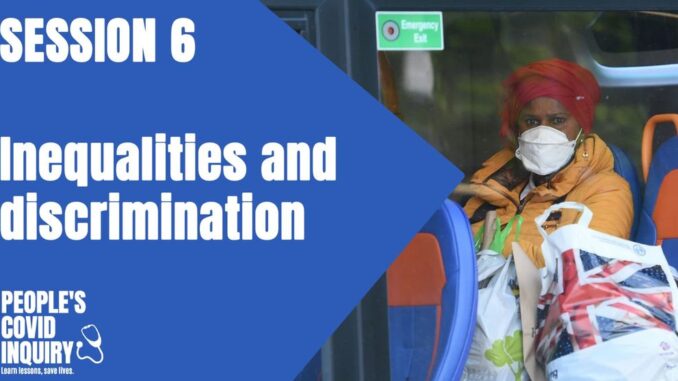
People on low incomes, women and BAME people all suffered health and economic inequalities as a result of the Government's response to the COVID-19 pandemic.
The sixth session of the People's Covid Inquiry heard that the move to virtual medical appointments had disproportionately impacted low income people, and those in overcrowded housing, who are more likely to be black or Asian in the UK.
GP and British Medical Association Deputy Chair of the representative body Dr Latifa Patel told the Inquiry the entire approach by the Government had assumed certain privileges:
"Space is a privilege; the whole motto [Hands, Face, Space] was a privilege..."
She explained:
"Where we [NHS staff] couldn’t get hold of mobile phone numbers, these patients were being prematurely discharged. We know that those on low incomes change their mobile number more often.
"Appointments are meant to be private, but patients were making appointments and [then speaking to us on phones] in cars and in toilets, as not everyone could afford the space in their homes to attend consultations or isolate from their families."
Harms of migrant charging
The existence of migrant charging had also caused harm to people in the UK, according to witness Alia Yule from Migrants Organise.
She told the Inquiry that Migrants Organise knew of one person who had died at home from COVID-19 as they were scared to seek treatment, as he was terrified that he would be deported.
"This is really about scapegoating a group of people, making migrants to blame for the erosion of our public services.
"The introduction of migrant charging is a way to sort of test the waters with the rest of the public about whether they will accept a healthcare system that is not actually based on need, but is maybe based a little bit on ability to pay."
No women at the table
The multifactorial ways in which women have been disproportionately impacted economically and physically during the COVID-19 pandemic in the UK were highlighted by witness Mary-Ann Stephenson, director of the Women's Budget Group.
She outlined how 79% of domestic violence refuges said they had seen an increase in demand during lockdowns, and this was particularly from women with complex needs.
The economic impact of lockdowns had hit women hardest as they were least likely to have sick pay and were also most likely to work in hospitality and retail sectors which had been among the hardest hit. The impact of loss of childcare and education settings had also disproportionately hit mothers in the UK, she explained.
Ms Stevenson pointed out that there were no members of SAGE who were experts in gender and that there was a risk of continued disproportionate economic impact on women from the pandemic due to the Government's focus on investing in construction rather than sectors women are more likely to work in.
She outlined work done by the women's budget group that had shown that if that money was spent on social care instead, that it would actually deliver a better return, even with raised salaries.
"If you look at what Joe Biden is doing in America at the moment and the scale of investment that is happening there and the recognition that this is a moment to make a change and do things differently shows it is possible to do that.
"You can ask why do we have these historically low levels of corporation tax, we need corporations to pay enough money to support these services."
Take part in the People's Covid Inquiry
The panel for the People's Covid Inquiry includes chair Michael Mansfield QC, Professor Neena Modi, Dr Tolullah Oni and Keep Our NHS Public's Dr Jacky Davis.
Take part in our survey
If you have enjoyed listening to witnesses about their experiences of the pandemic then please share your story by filling in our survey.
Watch again
The session was streamed live on all social media streams and can be watched on YouTube.
Listen again - Podcast for all sessions
Please subscribe to the PCI audio episodes here:
Register for the next session
The next session of the People's Covid Inquiry takes place at 7pm on Wednesday 19 May. You can register to take part by registering on Zoom.






Leave a Reply